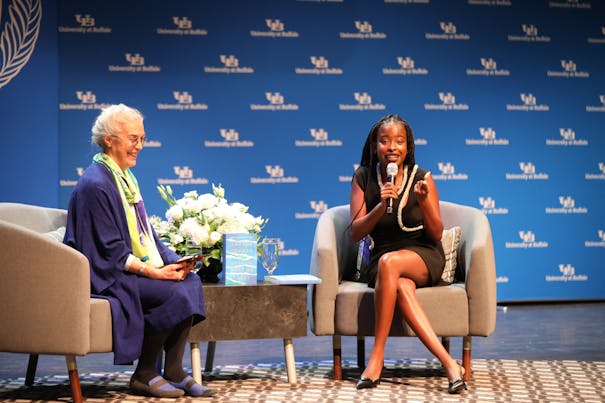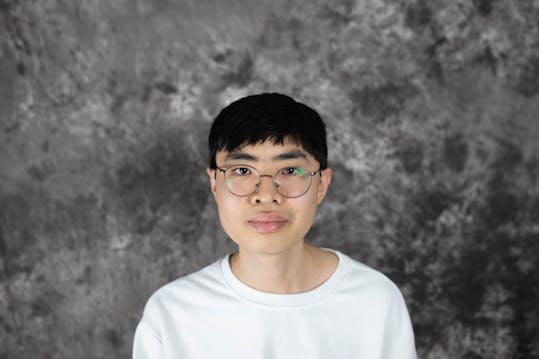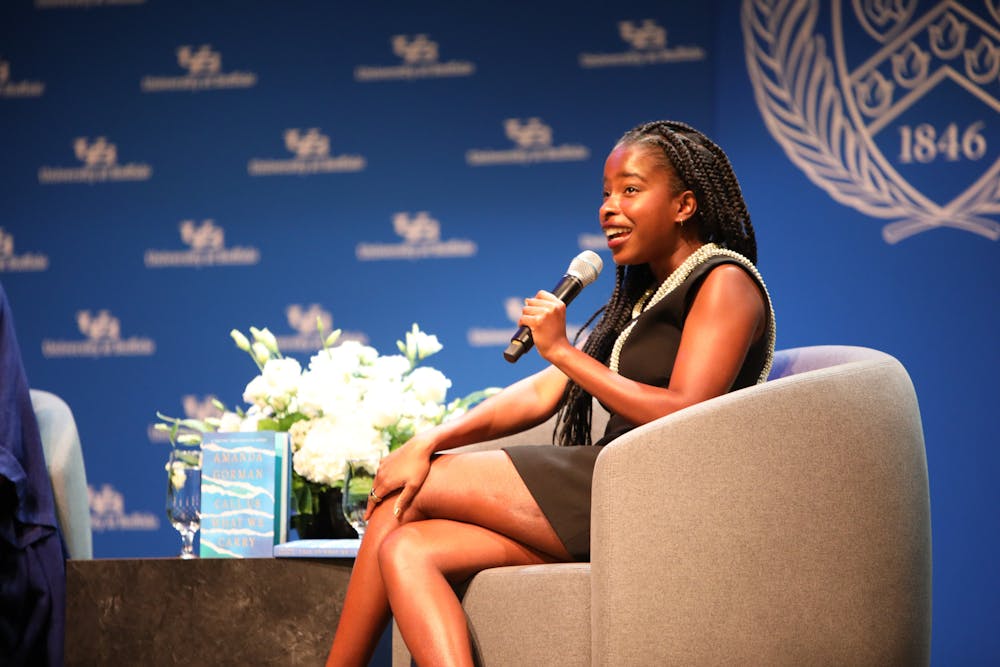Celebrated poet Amanda Gorman graced the Center For the Arts mainstage Tuesday night as the final speaker of the 2023-24 Distinguished Speakers Series to discuss her renowned poem, “The Hill We Climb,” the role of poetry in social justice, and her improbable rise to prominence.
Gorman was the first U.S. national youth poet laureate, and in 2021, she became the youngest inaugural poet when she delivered her poem, “The Hill We Climb,” at President Joe Biden’s inauguration in 2021, days after the Jan. 6 insurrection.
Speaking onstage with English professor Cristanne Miller, Gorman said tensions leading up to the inauguration almost led her to back out — but instead she saw it as an opportunity to open doors for other young poets.
After the events of Jan. 6, she rewrote the poem.
“This has to be reckoned with,” Gorman said. “I really, in that poem, wanted to bring us all home to what it feels to be American…What I was trying to do was inspired by the light of souls on the planet. And if people could feel that, that’s a poem worth writing.”
Since 2017 — the year when Urban Word appointed Gorman as the first National Youth Poet Laureate — Gorman drafted her poems with the intention of being selected for a presidential inauguration.
Despite the pressure to consistently create poetry “worthy for a nation,” Gorman remains confident in her abilities, trusting that her strength is earned. She reflected on her efforts to overcome her speech impediment — the result of her auditory processing disorder — and fears of public speaking.
“Confidence is something you have to fight and battle for and grow into. It does not arrive pre-born into people’s heads,” Gorman said. “From going through that work, once you do that journey, no one can take it away from you… Once you do the work of showing up and stepping forward, there’s not a single thing that brings you down.”
She says that confidence powered her to the lectern at the inauguration — and hinted that it could send her to the Oval Office in 2036.
In 2023 — two years after the inauguration — a Florida elementary school restricted access to “The Hill We Climb.” The ban on the poem was one of Gorman’s proudest moments, she said, because it put her among the ranks of history’s great poets.
“If this poem, at five minutes, can be that threatening that you’re revoking it from schools, it says something to how it speaks to the bedrock of America,” Gorman said.

Gorman says that confidence powered her to the lectern at the inauguration — and hinted that it could send her to the Oval Office in 2036.
Gorman currently spends her time researching the writings of past African American writers, including the works of Toni Morrison and Martin Luther King Jr. She intends to use her platform to continue the grand legacy of the writers before her, sharing a mantra she repeats before every performance.
“I’m the daughter of Black writers. We’re descended from freedom fighters who broke their chains and changed the world,” Gorman recites. “It’s part of history and ancestry but it’s also part of ownership and accountability… I’d better step up.”
As a young Black woman, Gorman knows what it’s like to be underestimated by society.
“If I were to say anything to young students, it would be to own your voice,” Gorman said. “You have something to say and the world owes it to you to listen.”
At the end of the event, Gorman read a poem from her most recent poetry collection, “Call Us What We Carry,” which explores the pandemic, divisiveness and the past with the question: “How do we move forward with all of that weight?”
“We continue speaking, writing, hoping, living, loving, fighting,” Gorman said. “That is to say we believe beyond a disaster.”
Mylien Lai is an assistant arts editor and can be reached at mylien.lai@ubspectrum.com
Jason Tsoi is an assistant features editor and can be reached at jason.tsoi@ubspectrum.com

Jason Tsoi is an assistant features editor at The Spectrum. He is an English major with a certificate in journalism. During his free time, he can be found listening to music and watching films.

Mylien Lai is the senior news editor at The Spectrum. Outside of getting lost in Buffalo, she enjoys practicing the piano and being a bean plant mom. She can be found at @my_my_my_myliennnn on Instagram.





